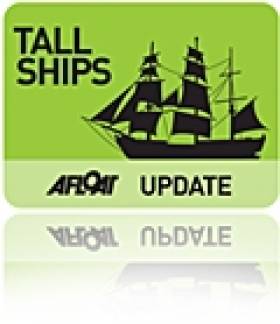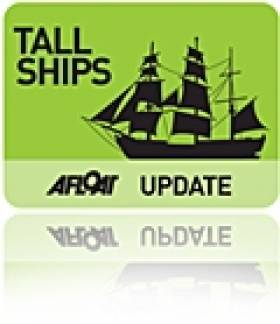Displaying items by tag: Arthur Ernest Guinness
Alliance Franҫcaise de Cork and Fondation Belém in association with the Port of Cork are pleased to announce arrival of the French tall-ship fleet, Belém, a 116-year old barque at one stage owned by the Guinness family, writes Jehan Ashmore.
During her four-day stay the pride of the French tall-ship fleet is to berth at Albert Quay, in the heart of Cork city-centre where the public can thread her timber decks on Saturday (2 July) between 11.30-17.00 hours and on Sunday (3 July) starting from 10.00 till 18.00 hours. There is an admission of €5 for adults, a concession of €3 and a family ticket costs €10.
Visitors can trace her long and varied career with an exhibit housed below decks of the historic vessel which was built in 1896 in Nantes. For nearly two decades she crossed the Atlantic transporting a diverse cargo but mostly spices, sugar and cocoa beans from her namesake port of Belém do Pará, on the north-east coast of Brazil bound for France. She would sail upriver on the River Seine to supply the cocoa beans for a Paris-based chocolate-maker.
Belem would later become under the British flag and she became the property of the Duke of Westminster, who converted her to a luxury pleasure yacht. In 1921 she was sold to the Hon. Arthur Ernest Guinness, who renamed her Fantôme II and took part in the Cowes regattas and cruised around the world between 1923 and 1924 with his family.
To read more on the vessel's other career's under several owners until her present-day role as a sail-training vessel operated by the Fondation Belém click HERE and also www.portofcork.ie
In addition to visitors boarding the Belem, the public are invited to attend free readings by the Cork poets William Wall and Thomas McCarthy. Accompanying the poets are French writers Maylis de Kerangal and Olivier Sebban for a session of Franco-Irish readings which too takes place on the Saturday evening between 18.00 -19.30 hours.
For further information contact Vytenė Laučytė, Cultural Coordinator, Alliance Franҫaise de Cork Tel: (021) 431 0677 or by email: [email protected]
All advance bookings for the visit on board the Belem are to be made at Alliance Franҫaise de Cork. Tickets are also available at the entrance to the tallship alongside Albert Quay, Cork. Last year Alliance Francaise celebrated its 50th anniversary
- Cork Harbour
- port of Cork
- Brazil
- Alliance Française
- Cork Harbour News
- Paris
- Belem
- Arthur Ernest Guinness
- Cocoa
- TallShips
- Albert Quay Cork
- Fondation Belem
- Tall Ships news
- Duke of Westminster
- Guinness
- Paris chocolate makers
- Fantome II
- William Wall
- Thomas McCarthy
- Cork poets
- French writers
- Maylis de Kerangal
- Olivier Sebban
Sailing Opportunities on 115-year French Tall-Ship
If you are interested in this adventure, registration is open until 1 March for those registering through the Alliance Française. A special Alliance Française price (excluding insurance) costs €780 and for €660 for those under 20 years of age. To book your place email: [email protected]
In July last year, the Belem, was chartered to make a special voyage to Dublin to celebrate the 50th Anniversary of Alliance Française in the capital. Taking part in the passage from Roscoff were 17 Irish people who joined in the crew. The four-day visit also celebrated the French national day, Bastille Day (14 July) which formed part of the inaugural French Market, held on the quayside close to the Convention Centre.
The ship was launched on June 10th 1896 and built in Nantes. She was named the Belem, after the north Brazilian port where the Crouan family had founded a trading post a few generations earlier. For nearly two decades the Belem sailed the Atlantic, carrying a diverse range of cargo but mostly spices, sugar and cocoa beans. The Belem would sail upriver on the River Seine to supply the cocoa beans for a Paris-based chocolate-maker.
During her long and varied career, the barque was sold to Arthur Ernest Guinness in 1921. Under the control of the Irish brewing dynasty, the vessel was renamed Fantôme II. The Guinness family established a strong attachment to the vessel which was completely refurbished from a working cargo vessel into that of a luxurious appointed yacht capable of accommodating 40 guests. Part of the work included an extension to the deckhouse for the purposes of a floating office, so business could be conducted, wherever the vessel happened to be.
In the period between March 1923 to March 1924 the Fantome went on a round the world tour going through the Panama Canal on the way out and returning via the Suez Canal.
Since 1987 the Belem has provided sail-training opportunities and is owned and operated by the Belem Fondation, a Paris based organisation set up by the Caisses d'Epargne, BPCE Group, after they bought back the ship in 1979. The principle role of the foundation is to keep the three masted barque as part of France's National Heritage. The vessel's historical and cultural significance was recognised in 1984 when the French government listed the barque as an historic monument.
Aside the role of sail training the Belem is unique in that she continues to carry occasional commercial cargo. In recent years the vessel has carried cargoes of wine from Bordeaux to Montreal in the Canadian French speaking province of Quebec. For information about Alliance Française in Ireland logon HERE in addition to the history and work of the Belem Foundation by clicking here.
Looking for further reading on Tall Ships in Ireland? Click the links below:
Click this link to read all our Tall Ships Stories on one handy page
Previewing Ireland's Tall Ships 2011 Season
Can Ireland Get a New Tall Ship?





























































